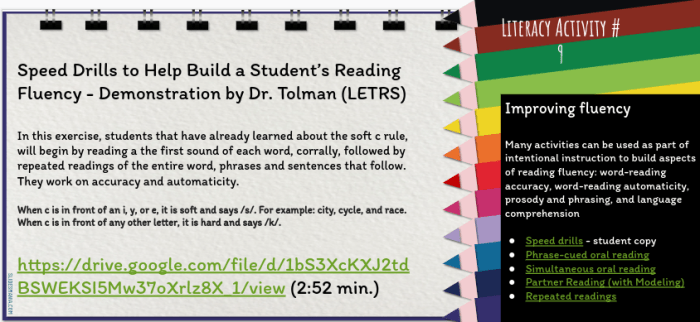The LETRS Unit 1 Session 4 Check for Understanding assessment plays a pivotal role in evaluating students’ comprehension of the session’s key concepts and their readiness to progress further. This guide provides an in-depth analysis of the assessment’s structure, preparation strategies, and implications for instructional decision-making.
The session covers fundamental concepts related to literacy instruction, including phonemic awareness, phonics, and fluency. The assessment is designed to gauge students’ understanding of these concepts through a variety of question types, ranging from multiple-choice to short answer and performance tasks.
1. Key Concepts

Significance of “letrs unit 1 session 4 check for understanding”
The “letrs unit 1 session 4 check for understanding” assessment plays a crucial role in evaluating students’ comprehension of key concepts covered in the session. It provides an opportunity to assess their understanding of foundational knowledge and skills, ensuring they are ready to progress further in the course.
Overview of Key Concepts
- Introduction to literacy education
- Principles of effective literacy instruction
- Assessment and evaluation in literacy education
- Instructional strategies for teaching reading and writing
Purpose and Structure of “Check for Understanding” Assessment
The “check for understanding” assessment is designed to:
- Identify areas where students may need additional support
- Provide feedback to students on their progress
- Inform instructional decisions
The assessment typically consists of a variety of question types, including multiple choice, short answer, and essay questions.
2. Assessment Structure: Letrs Unit 1 Session 4 Check For Understanding
Format and Components
The “check for understanding” assessment typically consists of:
- Multiple choice questions
- Short answer questions
- Essay questions
Question Types
The assessment may include questions that assess:
- Knowledge of key concepts
- Understanding of instructional strategies
- Ability to apply knowledge to real-world situations
Time Allocation and Scoring Criteria, Letrs unit 1 session 4 check for understanding
The assessment is typically timed, with a specific amount of time allocated for each section. The scoring criteria will vary depending on the type of question and the specific requirements of the assessment.
3. Student Preparation
Strategies for Effective Preparation
- Review course materials thoroughly
- Practice skills through exercises and assignments
- Manage time effectively during the assessment
- Seek clarification from instructors or peers when needed
Importance of Clarification and Support
Students should not hesitate to ask for clarification or support if they encounter difficulties during their preparation. This can help them better understand the concepts and improve their performance on the assessment.
4. Assessment Analysis
Summary Table
The following table summarizes the key concepts, question types, and scoring criteria of the “check for understanding” assessment:
| Key Concepts | Question Types | Scoring Criteria |
|---|---|---|
| Literacy education principles | Multiple choice, short answer | Accuracy, completeness |
| Effective literacy instruction | Essay | Depth of understanding, clarity of writing |
| Assessment and evaluation | Multiple choice, short answer | Accuracy, justification |
Areas of Challenge
Students may encounter challenges in areas such as:
- Understanding complex concepts
- Applying knowledge to real-world situations
- Time management
Strategies for Analysis and Feedback
Instructors can analyze student performance on the assessment to:
- Identify areas where students need additional support
- Provide targeted feedback to improve student learning
5. al Implications
Informing al Decisions
The results of the “check for understanding” assessment can inform al decisions, such as:
- Adjusting lesson plans to address areas of need
- Providing additional support to struggling students
- Enhancing instructional strategies to improve student learning outcomes
Formative Assessment and Student Learning
Formative assessments, such as the “check for understanding” assessment, play a crucial role in improving student learning outcomes by:
- Providing feedback to students on their progress
- Identifying areas where students need additional support
- Informing al decisions to improve instruction
FAQ Summary
What is the purpose of the LETRS Unit 1 Session 4 Check for Understanding assessment?
The assessment is designed to evaluate students’ comprehension of the key concepts covered in the session, including phonemic awareness, phonics, and fluency.
What types of questions are included in the assessment?
The assessment includes a variety of question types, including multiple-choice, short answer, and performance tasks.
How can students prepare for the assessment?
Students can prepare for the assessment by reviewing course materials, practicing skills, and seeking clarification from instructors or peers.
How can educators use the results of the assessment to inform instructional decisions?
Educators can use the results of the assessment to identify areas where students may need additional support and make informed decisions about lesson plan modifications.